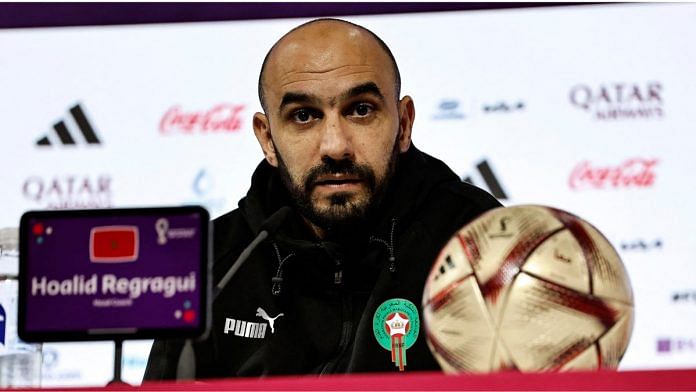Corbeil-Essonnes: Ahead of the World Cup semi-final between Morocco and France, Hichem Sayadi is feeling torn by divided loyalties.
Speaking from his local sports hall in a French suburb south of Paris, where Morocco coach Walid Regragui started playing football, and wearing a Paris St Germain tracksuit, the 29-year- old says he will eventually come down on the side of Morocco.
“(Regragui) is from around here, he has played where we play, and also it is an African team … it is historic,” said Sayadi, who is French-Algerian, adding that “it kills me to be against Kylian (Mbappe).”
Appointed coach of Morocco’s national team this year, Regragui, 47, started his football journey in Corbeil-Essonnes, less than 30km from the French capital, where he grew up.
He played for mainly French teams, including AC Ajaccio, Dijon and Grenoble, as well as for Morocco from 2001-09.
At the World Cup in Qatar, Morocco beat Belgium to top their group before overcoming Spain and Portugal to become the first African and Arab team to reach the last four in the global showpiece event.
In Regragui‘s neighbourhood of Montconseil, tower blocks surround the sports hall and a commercial centre of mostly closed shops.
Residents, many of African origin, say their “hearts swing” and they are sitting “between two chairs” as Wednesday’s match brings up multiple identities and sporting allegiances.
Team mates and friends will face each other on the pitch, including Mbappe and Achraf Hakimi who both play for Paris St Germain. Regragui played alongside France striker Olivier Giroud for Grenoble in 2008.
There is a sense of historical redress in Morocco’s journey in which they have knocked former colonial powers out of the tournament, including their own.
In the last 16 they beat Spain, which colonised part of the country in the 20th century and still controls the enclaves of Ceuta and Melilla, and now face France, which colonised Morocco until 1956.
Regragui stayed sports-focused at a news conference in Qatar on Tuesday, the eve of the game.
“I am a dual national. It is an honour and pleasure to play against France but it is just football … I’m here as a football coach and what interests me is to win,” he said.
‘Didn’t Give Up’
Those who knew Regragui as a child in Corbeil-Essonnes say he was constantly playing football, taking trains to matches and that although he was not the best among his peers, he was the most determined.
When he started playing professional football with Ajaccio and Dijon, Regragui would take teenagers from the neighbourhood to the clubs, including Sayadi when he was a boy of around 14 years of age.
Regragui has continued this tradition in Qatar by flying out his mother and a few close friends to Doha.
Moussa Jagne, a 20-year-old football talent scout, believes a Morocco win would give young people from the area the confidence to pursue their ambitions.
“There are cliches about neighbourhoods (like ours), often they are spoken about badly, now it is good to speak about success – like in relation to Walid,” he said.
‘We Can Mix Things Up’
In France, where the far-right is gaining in strength, the subject of identity has become a political flashpoint, and the Morocco-France match has become a “test of loyalty” for French citizens of immigrant origin, says Rim-Sarah Alouane, a legal researcher on discrimination and civil liberties at the University of Toulouse.
“(Right-wing politicians) do not accept that France has evolved and that there is a new generation that is confident in their multiple identities,” she said.
Following France and Morocco’s quarter-final victories, Eric Zemmour, a far-right politician who won 7% in the first round of this year’s presidential elections, said that “one cannot be for one and for the other”.
Faycil Achouche, a 20-year old waiter from Montconseil, does not see a contradiction. He says he has supported France through so many tournaments and he now wants to cheer on his other country, Morocco.
“I already know the emotion of seeing France win, now Morocco is in the World Cup, we can mix things up,” he said. -Reuters
(Reporting by Layli Foroudi and Clotaire Achi, editing by Silvia Aloisi and Ed Osmond)
Also read: ‘Representing my country is an emotional thing,’ says Argentina coach after win against Croatia



